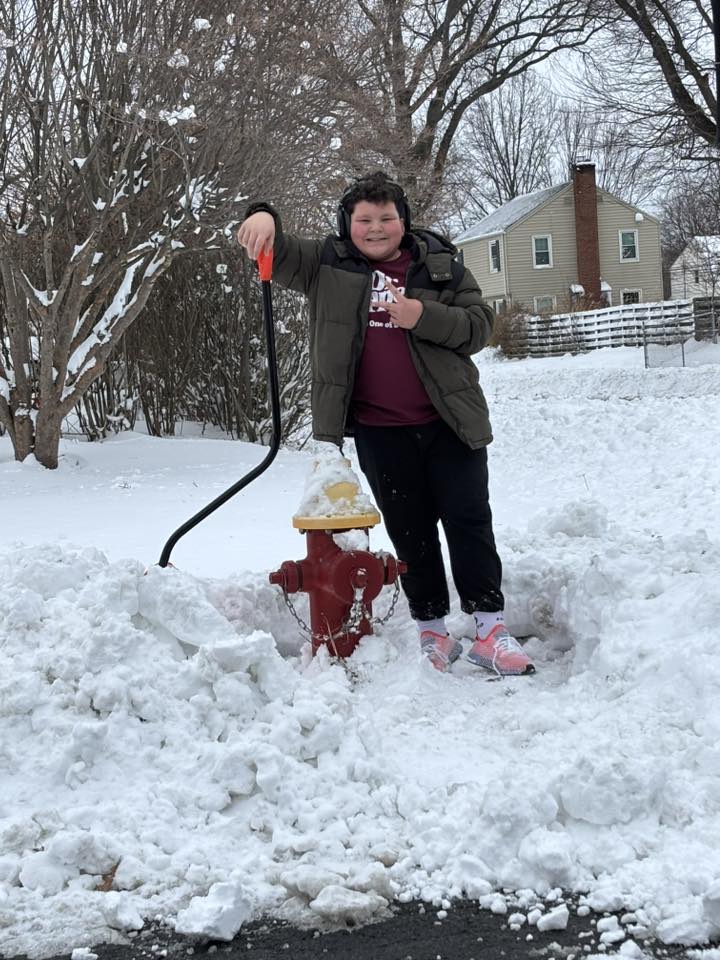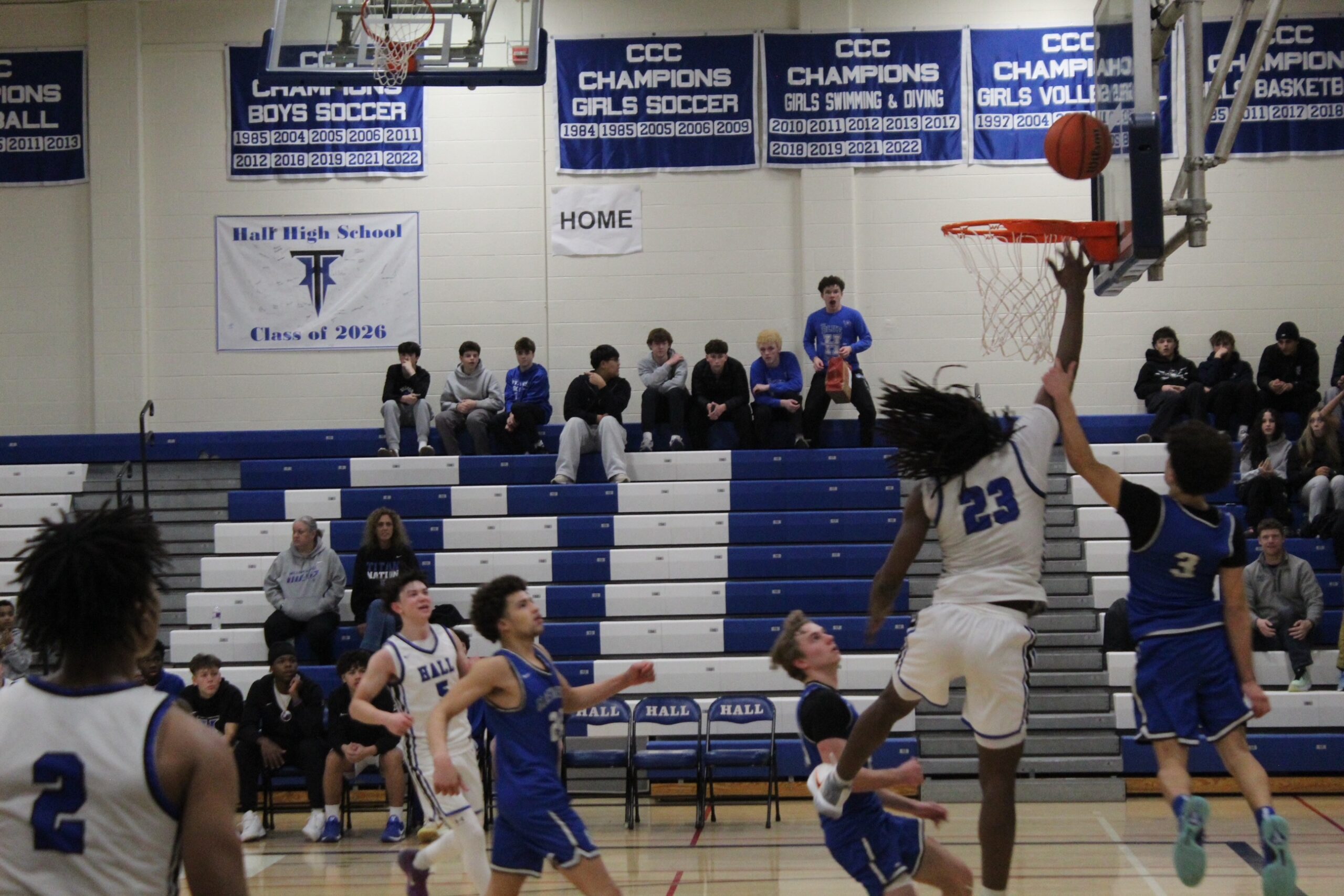Coronavirus Hospitalizations Continue to Decline in Connecticut

Audio By Carbonatix
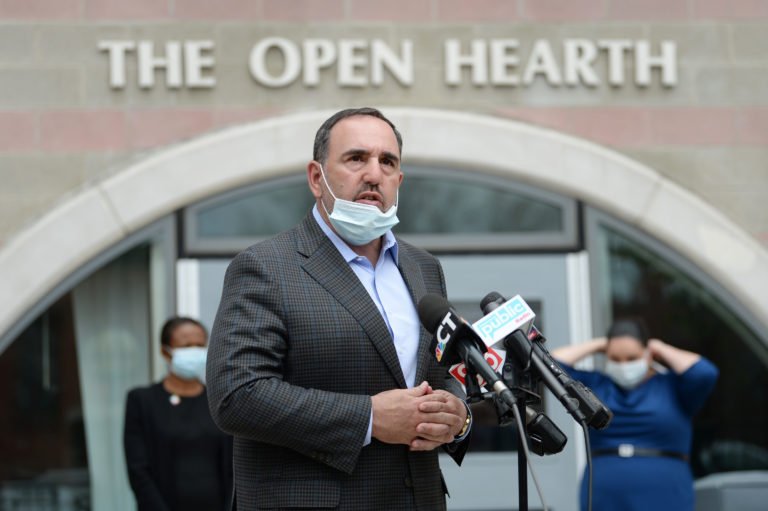
Jeffrey Flaks, President and CEO of Hartford HealthCare, addresses the media at a press conference at The Open Hearth homeless shelter after medical personnel from Hartford HealthCare tested clients and staff for COVID-19 with their mobile testing unit Wednesday morning. 90 clients and 15 staff members were tested according to Marilyn Rossetto, Executive Director of The Open Hearth as part of Hartford HealthCare’s efforts to expand it’s testing capacity to underserved city residents. Photo credit: Cloe Poisson, CTMirror.org
Continued decline in the number of hospitalized, but fatalities rose by 79 — bringing the death toll to 2,168. West Hartford had one more fatality reported Wednesday.
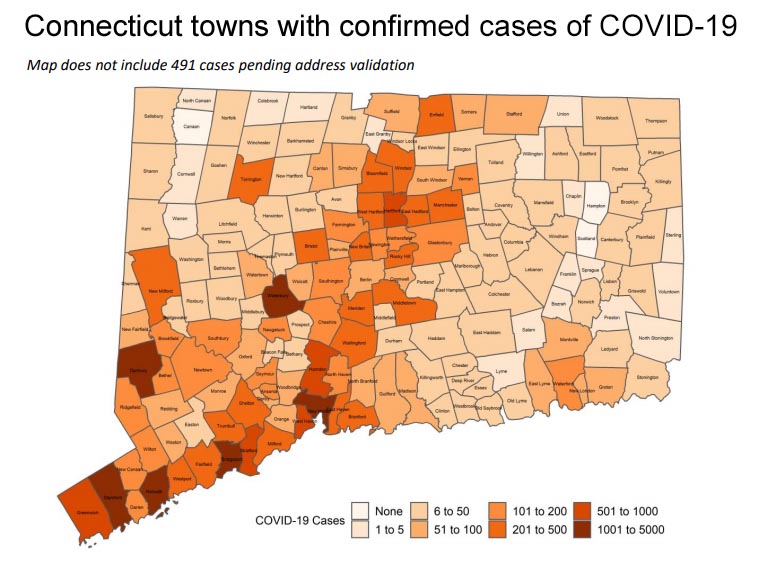
By Mark Pazniokas and Gregory B. Hladky, CTMirror.org
West Hartford-specific information provided by Ronni Newton, We-Ha.com
The latest Connecticut statistics on the COVID-19 pandemic showed a continued decline Wednesday in the number of people hospitalized with the virus, but the number of fatalities in the state rose by 79 – bringing the death toll to 2,168.
In West Hartford, the total number of confirmed positive cases of COVID-19 is now 300, an increase of 15 since Tuesday. There was one additional COVID-19-related fatality reported, bringing the total to 49.
Gov. Ned Lamont said the overall numbers were an extension of “the positive trend we’ve seen now for over a week.” Coronavirus hospitalizations dropped by 41 since Tuesday and there are now 1,691 victims of the disease in hospitals around the state.
But despite the falling statewide numbers of COVID-19 hospitalizations, officials in southeastern Connecticut reported seeing a slight rise in hospital cases in their region.
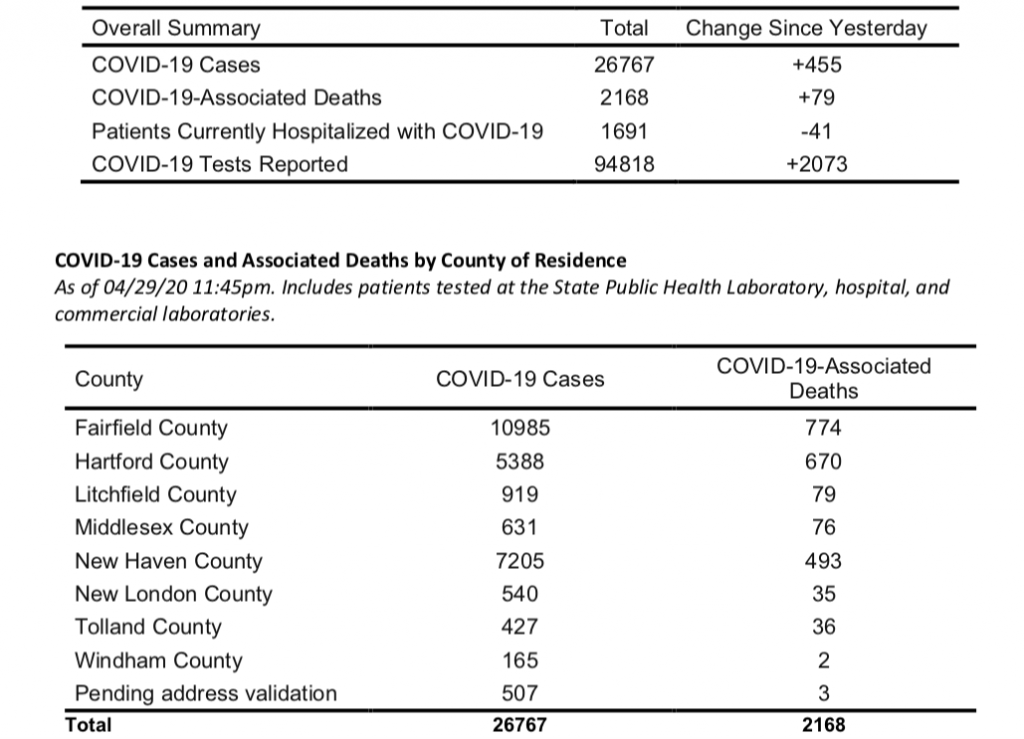
Lamont and other officials at his regular afternoon briefing reiterated that, despite the generally encouraging trends, Connecticut needs to go slow about reopening its economy.
Ridgefield First Selectman Rudy Marconi, who has now recovered from his own difficult, multi-week battle with coronavirus, warned that Connecticut needs to be cautious “every step of the way” and not reopen too soon.
“That would be perhaps the worst single thing we could do right now,” Marconi, a long-time Democratic leader, said.
State Rep. Jane Garibay, D-Windsor, is another recovered victim of COVID-19 and she also said the state must be extraordinarily careful about how it reopens.
“It’s just so easy to wear a mask,” she said. Both Marconi and Garibay said they cooperated with efforts by health officials to trace people with whom they may have been in contact while they were infectious.
Lamont was non-committal about how Connecticut people should be planning for this summer. “It’s too soon to say what’s going to happen in July and August,” the governor said. He added that his own daughter, who is planning a Labor Day wedding, is continually asking him about the infection and hospitalization trends.
The governor’s afternoon COVID-19 briefing ended – abruptly and unusually – when a fire alarm went off. Fortunately, it was a false one, caused by a contractor.
Coronavirus cases rising in southeastern Connecticut
The number of COVID-19 cases is continuing to drop in Fairfield County and the New Haven region, Yale New Haven Health officials said Wednesday, but southeastern Connecticut and Rhode Island are “starting to see an uptick” in hospitalizations.
Lawrence Memorial Hospital in New London now has 31 COVID-19 positive patients and Westerly Hospital just over the Rhode Island border has five, officials said.
Patrick Green, president of Lawrence Memorial, said the coronavirus surge in his part of Connecticut so far hasn’t been as big as was once predicted. Green said his hospital and Westerly Hospital, which are both part of the Yale New Haven system, currently have enough personal protective gear and ventilators to handle the COVID-19 caseload.
The news of the rise of pandemic cases in the eastern part of Connecticut came with renewed warnings from Yale-New Haven experts that it is far too early for this state to depart from social distancing and economic closures.
“If we loosen those up at this moment, we will see cases climb,” said Dr. Tom Balcezak, chief clinical officer for the multi-hospital Yale New Haven system. “This is not the time for us to loosen social distancing and other measures.”
Marna Borgstrom, CEO of Yale New Haven Health, agreed. “I don’t think we’re at a point where we can celebrate,” she said.
Balcezak and Borgstrom echoed Gov. Ned Lamont’s desire for dramatic increases in statewide testing before Connecticut’s economy is restarted in full. Borgstrom said the governor would eventually “love to get us up to 50,000 tests a day,” but stocks of supplies for testing and improved processing speed still need improvements.
Balcezak also warned that a COVID-19 vaccine is “at least a year away” and that various procedures and drugs now being tested on coronavirus patients, including using plasma from recovered individuals, are not yet proven to be effective.
But the dramatic increase in the use of “tele-health,” where doctors and nurses communicate with patients via computers and the telephone, is one innovation resulting from the pandemic that Balcezak said has been terrific. “I think that is something that will stay and stay forever,” he said.
Local long-term recovery committees proposed
Lamont also called on local officials Wednesday to set up “long-term recovery committees” to help manage municipal and community efforts to recover from the major economic and social issues triggered by the COVID-19 pandemic.
While the Lamont administration has not yet made any firm decisions about when to start reopening the state’s economy, the governor said creating these local panels to take a longer-term perspective will be a real help in the future.
“Responding to a disaster is a shared responsibility that calls for the involvement of everyone – state government, local government, and a wide range of community partners,” Lamont said in a statement Wednesday.
The local recovery committees should include representatives of businesses, community and faith organizations, local government, non-profits and philanthropic groups, according to the governor.
New mobile testing unit in Hartford
Hartford HealthCare’s mobile testing unit debuted Wednesday on a sunny patio outside the Open Hearth, a shelter and recovery community for men. It’s a unit that will roam the city daily, increasing access to testing for COVID-19.
Jeffrey A. Flaks, the president and chief executive of the hospital system, said the mobile unit will “bring testing to the people who need it most, most conveniently, and where it will make the greatest differences.”
On Wednesday, nasal swab samples were taken from 105 residents and staff members of Open Hearth to be tested at Hartford Hospital or, more likely, a Quest Diagnostic lab in Massachusetts. Results are expected in two days.
“Going forward, this is the type of testing that is necessary so that we can bring our region back to work, so that we can start bringing people back into circulation,” Flaks said. “Where we’re starting it are in the places that we think are the most critical and essential to the community.”
Hartford HealthCare is operating a drive-up – and occasionally walk-up – testing site on Hudson Street, near Hartford Hospital. Flaks said he hopes to announce a second fixed testing site in the city’s North End. The system’s daily testing capacity in Hartford is now 700.
The system also has opened or plans to open testing sites in Mystic, Westport, Newington and Enfield, he said.
Flaks said the pandemic has exposed inequities in the region’s health care that Hartford HealthCare and others must address.
“We are looking to be better,” he said. “There are clearly lessons being learned.”
Sarah Lewis, the vice president of health equity at Hartford HealthCare, said there is a need to rethink, redesign and recalibrate the delivery of care.
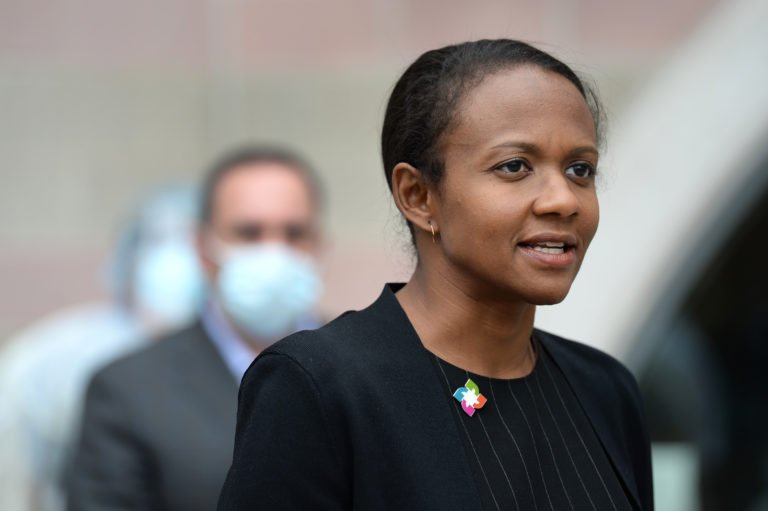
Sarah Lewis, Vice President for Health Equity at Hartford HealthCare. Ninety clients and 15 staff members were tested Wednesday at The Open Hearth as part of Hartford HealthCare’s efforts to expand it’s testing capacity to underserved city residents. Photo credit: Cloe Poisson, CTMirror.org
“Bringing mobile testing to our community members who need it where they need it is one of those ways we can recalibrate our health care delivery and bring it to our front-line staff here at Open Hearth.”
Mayor Luke Bronin said Lewis has worked with the city’s health director, Liany E. Arroyo, to select the testing locations for the mobile unit. Shelters and nursing homes are getting priority to protect staff and vulnerable populations.
“To do 105 tests at one site is really a significant advance in this fight,” Bronin said.
Renewed effort by states to block “Public Charge” rule
Connecticut is joining the latest legal fight to block a Trump Administration plan to further curtail immigration to the U.S., arguing that the middle of the COVID-19 pandemic is no time to discriminate against poor immigrants.
State Attorney General William Tong’s office Wednesday filed a joint motion with New York, Vermont, and New York City asking a federal court to temporarily stop the implementation of President Trump’s “Public Charge Rule.”
The action filed with the U.S. District Court for the Southern District of Southern New York involves a federal plan to use a rule that would make it more difficult or immigrants to get or keep a green card if they use public benefits such as food stamps or Medicaid.
“Every person needs access to health care right now,” Tong said of the new legal filing. The states and New York City argue that the planned rule effectively discriminates against poorer immigrants likely to use public services.
The U.S. Supreme Court earlier this year denied petitions to block implementation of the rule, but last week ruled the coalition involved in the legal action could seek relief from the district court.
“We are taking that action now to protect public health and our economy,” Tong said in a statement.
Third Connecticut inmate dies from virus
A 74-year-old man serving a life sentence for murder died from COVID-19 Tuesday, the third Connecticut inmate to succumb to the virus.
The man, who had underlying health conditions, was incarcerated at Osborn Correctional Institution before being transferred to the UConn Health Center in Farmington on April 19.
“Any life lost to this terrible disease is a tragedy,” said Department of Correction Commissioner Rollin Cook. “I vow to keep working to do whatever possible to continue to limit the spread of the coronavirus until this health crisis passes. My condolences go out to the deceased individual’s family.”
As of Tuesday, 390 inmates and 317 corrections staff had contracted the virus. More than 140 staff and 228 inmates have recovered from COVID-19.
Murphy pushes bill to boost critical medical supplies
As shortages continue of medical and coronavirus protective equipment, Sen. Chris Murphy has introduced legislation that would force President Donald Trump to use his authority to eliminate shortages of critical supplies.
“The supply chain is broken,” Murphy said, citing chronic shortages of COVID-19 tests, ventilators and protective gear. “And the president has chosen to stand down.”
Trump has signed an executive order allowing his use of the Defense Production Act, a law that gives the president authority to require private businesses to produce materials needed in war and could be used to respond to the pandemic.
But Trump has been hesitant to use this authority, at least until last night, when the president said he’d invoke the Defense Production Act to classify meat plants as essential infrastructure that must remain open.
On Wednesday, Murphy and Sen. Tammy Baldwin, D-Wis., introduced the Medical Supply Transparency and Delivery Act, which would force Trump’s hand.
“The president’s failure to federalize the medical supply chain has left states operating in a Lord of the Flies environment in the middle of a global pandemic,” Murphy said. “Governors are forced to compete against each other while suppliers price-gouge.”
Murphy’s bill would require the president to appoint a civilian who would coordinate efforts to oversee federal procurement of critical medical equipment and supplies.
“Right now they are scattershot,” Senate Minority Leader Charles Schumer, D-N.Y., said Wednesday of those efforts.
Murphy’s bill would also appoint an inspector general to investigate the collection and distribution of supplies.
“Democracies are not well constructed to deal with an emergency,” Murphy said.
So, Congress approved the Defense Production Act to give the president powers to make unilateral decisions during an emergency.
Murphy’s legislation has 46 Democratic co-sponsors, but Republican support is needed to move the legislation through the GOP-controlled Senate.
Channel 3 Kids Camp cancelled for summer
The board of directors for the Channel 3 Kids Camp in Andover Wednesday announced that concerns about the risks of the coronavirus pandemic have forced them to cancel the popular camp’s summer program.
This summer would have marked the 110th consecutive year for the overnight and day camp.
The board said decisions about fall programs will be made in the next few months.
CT Mirror reporters Ana Radelat and Kelan Lyons contributed to this story.
Reprinted with permission of The Connecticut Mirror. The author can be reached at [email protected].
Like what you see here? Click here to subscribe to We-Ha’s newsletter so you’ll always be in the know about what’s happening in West Hartford! Click the blue button below to become a supporter of We-Ha.com and our efforts to continue producing quality journalism.


